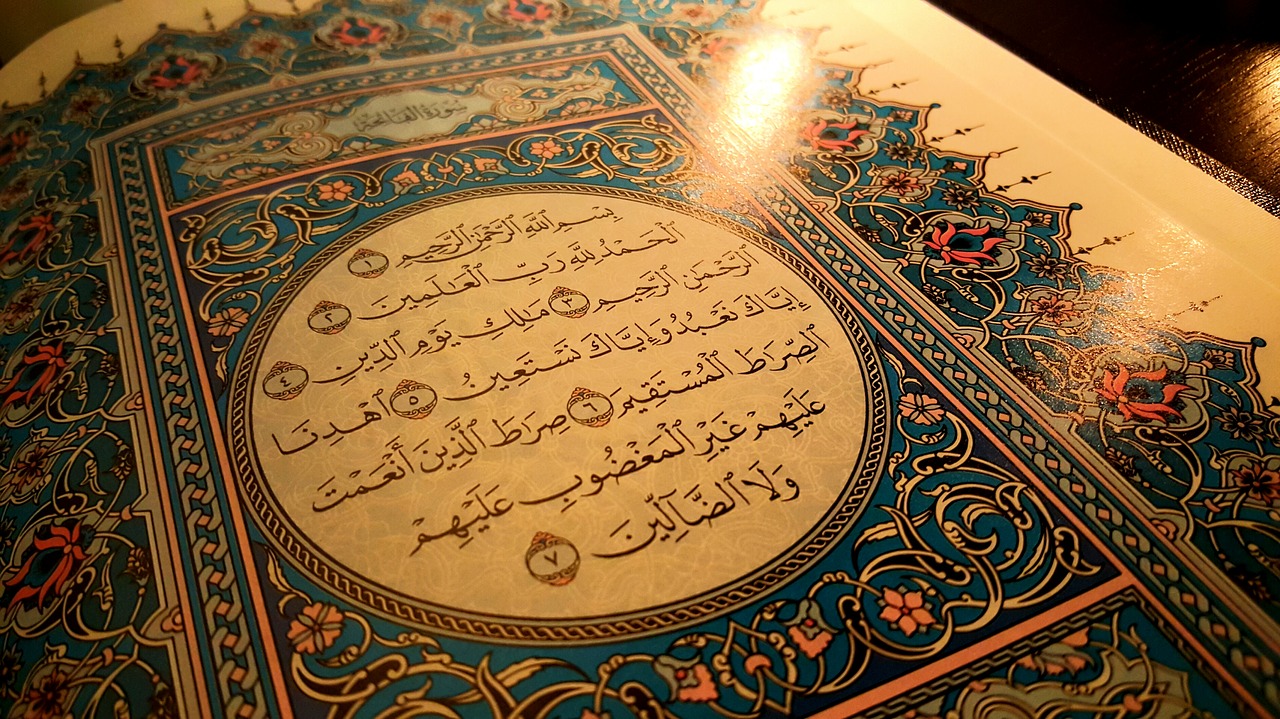When we look to the life of the Prophet of Allah (ﷺ), we see that he established a community around him consisting of individuals and families. This early community of believers was raised with the Qur’an as it was revealed. In particular, the first five revelations in Makkah transformed them on an individual and societal level. What is it about the early revelations that made the companions who they are?
Makkan revelation
1. Surah Al-Alaq: Transition from ignorance to knowledge
The first revelation was part of Surah Al-Alaq.
اقْرَأْ بِاسْمِ رَبِّكَ الَّذِى خَلَقَ – خَلَقَ الإِنسَـنَ مِنْ عَلَقٍ – اقْرَأْ وَرَبُّكَ الاٌّكْرَمُ – الَّذِى عَلَّمَ بِالْقَلَمِ – عَلَّمَ الإِنسَـنَ مَا لَمْ يَعْلَمْ
“Read! In the Name of your Lord Who created, created man from a clot. Read! And your Lord is the Most Generous. Who has taught by the pen. He has taught man that which he knew not. [Al-Alaq: 96: 1-5]
Within this Surah, we find that Allah has commanded us to learn. It is compulsory to learn for this Deen, from the very beginning is based on knowledge; learning and acting upon knowledge.
The first revelation takes us out of the darkness of ignorance to the light of knowledge. Knowledge, as we know is of many types. The highest priority is to be given to the knowledge of Allah and any knowledge that brings us closer to Allah – our Creator. This is priority number one, thereafter, the other kind of knowledge will follow.
Do we differentiate between different kinds of knowledge? Yes, we do differentiate between beneficial and unbeneficial knowledge. And we say:
“Every kind of beneficial knowledge is required to be learnt, but, it is not compulsory on every individual. The compulsory knowledge is the knowledge that we need to know to be able to meet Allah with.”
Allah will not ask us about quantum physics or black holes for instance on the Day of Judgement. This knowledge is not compulsory to learn even though it may be beneficial and required as a community. What we will be asked about is fulfilling our obligations and our duties, firstly towards Allah, then towards our family and the community.
This was obligation number one which Allah has revealed to the Prophet (ﷺ). The Makkan community started with the compulsory knowledge of Iqra, read and recite. And through their recitation of the Qur’an, adhering to the Sunnah and reflecting, they acquired the beneficial knowledge.
Practical Step: Number One
- So learning this principle is paramount: We have to occupy ourselves with the compulsory knowledge first, teaching ourselves about Iman (belief), Salah (prayer), Tahara (cleanliness), knowing the limits of Halal (permissible) and Haram (prohibition), our duties to Allah, duties towards our parents, our neighbours, our friends and our community.
- In regards to Halal and Haram. We live in very interesting times with much confusion and ever the blurring of social norms and practices regardless whether it is ‘right’ or ‘wrong’. We need to know where Allah has drawn the boundaries, and then how we can operate within them and without overstepping them. This is a compulsory knowledge.
2. Surah Al-Qalam: Transition from bad character to good character
The second of the Makkan revelation was Surah Al-Qalam.
ن – وَالْقَلَمِ وَمَا يَسْطُرُونَ – مَآ أَنتَ بِنِعْمَةِ رَبِّكَ بِمَجْنُونٍ – وَإِنَّ لَكَ لاّجْراً غَيْرَ مَمْنُونٍ – وَإِنَّكَ لَعَلَى خُلُقٍ عَظِيمٍ
“Nun. By the pen and by what they write. You, by the grace of your Lord, are not insane. Verily, for you will have a reward never ending. Indeed, you are on an exalted character.” [Al-Qalam: 68: 1-4]
In this Surah, there is a unique Ayah that is nowhere else to be found in the Qur’an: “Indeed, you are on an exalted character.” Who is describing the Prophet (ﷺ)? Allah Almighty has described the Prophet (ﷺ) as having the best character.
In that period of Jahiliyya, the revelation came to address the challenges and needs of the people. The first transition as we have met was shift from ignorance to knowledge. And in this Surah, there is a shift from bad character to good character.
Saeed bin Hisham asked Aisha (Radiallahu Anha): “Mother of the Faithful, tell me about the character of the Messenger of Allah (ﷺ).” She said: “Don’t you read the Qur’an?” I said: “Yes.” Upon this she said: “The character of the Messenger of Allah (ﷺ) was the Qur’an.” [Muslim]
The Prophet’s (ﷺ) character was the Qur’an. He was pleased with everything that the Qur’an enjoined and he was angry with what Qur’an prohibited.
Knowledge and adopting good character are not two distinct and sequential steps, first knowledge and then comes character, rather, they are parallel – one going with the other. Knowledge and character work together to improve a person. These are like lanes on a motorway; we advance according to our effort. Some advance faster than others but the important thing is to strive and thereafter advance.
The Qur’an focused on the character very early on to show the significance of good character and the importance of improving it. Good character governs the way we behave, the way we speak, the way we think, the way we act, the way we react, the way we control our anger, the way we control our tongue, our limbs, our whims and our desires. And when the people asked one of the scholars about the definition of good character he said:
“Having a cheerful face and being patient with people.”
Practical Step: Number Two
- The Prophet (ﷺ) had the best character of all the people. The Prophet (ﷺ) was with the best character with his Lord, his family and all the people in general. He had the best character and manners all throughout his life in every situation and towards everyone even before he was a Prophet (ﷺ).
- To improve and better our character is also an obligation. We need to also teach our children to adopt good character, not only through imparting knowledge but also leading by example and demonstrating what good character looks like so they too can emulate.
3. Surah Al-Muzzammil: Transition from separation to connection to Allah
The third revelation which was revealed in Makkah was that of Surah Al-Muzzammil.
يأَيُّهَا الْمُزَّمِّلُ – قُمِ الَّيْلَ إِلاَّ قَلِيلاً – نِّصْفَهُ أَوِ انقُصْ مِنْهُ قَلِيلاً – أَوْ زِدْ عَلَيْهِ وَرَتِّلِ الْقُرْءَانَ تَرْتِيلاً
“O you wrapped one! Stand to pray all night, except a little. Half of it or less than that, a little or a little more. And recite the Qur’an slow rhythmic manner.” [Al-Muzzamil: 73:1-5]
Standing up and praying during the night is what builds that relationship with Allah. This Surah gives the third transition – spiritual transition – from the vacuum of separation to the comfort of spiritual connection with Allah. Nothing can fill this void except Allah.
We can see on a daily basis; people who are rich and famous but they don’t have contentment and satisfaction in their lives. Those who are seeking wealth – no satisfaction! Those who are seeking fame – no satisfaction! Those who are seeking status – no satisfaction! And the list goes on…. There are plenty of people; despite having ‘everything’ others can only dream of, yet they are not happy. Actually, many are depressed and are seeking solace through drugs. No drugs, nor fame, nor power, nor wealth can fill this void within. What can fill this void? Only Allah. So part of feeling wholeness and contentment is establishing the vital relationship with Allah.
Salah was not revealed for a tick the box exercise, Salah was revealed to connect the servant to His Lord Almighty. Unless we get this right, nothing will be right in our life. The Prophet (ﷺ) said:
“Salah is the main pillar of the Deen, whoever established it has established the Deen.” [Al-Bayhaqi]
The Prophet (ﷺ) called the Salah the entire Deen. Why? The whole Deen revolves around the Salah. It’s the connection with Allah. If we to lose this connection, it’s very easy to be tempted by the Dunya, and to move away from our principles, to make compromises and go towards the Haram or even overstep it. Without the connection to Allah, it is all too easy to go astray on the wrong path.
The connection to Allah is like the shield and an antidote; it protects us from being overcome by people, shaytan or the dunya. When we have this connection, we are always protected by Allah.
“Allah is the Protecting friend of those who believe.” [Al-Baqara: 2:257]
Allah has made a promise. He made it an obligation upon Himself to defend the believers and protect them. So within the Deen we have protective shield but unless it’s activated its good as having none. This activation happens through Salah, the true Salah.
The Prophet (ﷺ) said: “Pray the way you have seen me praying.” [Bukhari]
Unfortunately, we cannot see the Prophet (ﷺ) praying but we can see his Salah through the narrations we have which describes it in detail.
Practical Step: Number Three
- We need to have a connection with Allah and teach our children to do the same. How to connect with Allah? It’s not the robotic Salah which we need – we need the real Salah, the real connection with Allah. Improving our Salah can only reflect positively on our life and on our family.
- We need this relationship to be strong with Allah, and then the bondship with our family will also be strong. But if our Salah is unstable and in autopilot, then what can we build with that? It’s not too late, we still have time. Let’s make our Salah better and feel the taste and sweetness of Salah. The Prophet (ﷺ) said: “The coolness of my eyes lies in Salah.” [Musnad Ahmad]
4. Surah Al-Muddathir: Transition from separation to connection with the people
The fourth revelation was Surah Al-Muddathir.
يأَيُّهَا الْمُدَّثِّرُ – قُمْ فَأَنذِرْ – وَرَبَّكَ فَكَبِّرْ
“O you enveloped in garments! Stand and warn. And magnify your Lord.” [Al-Muddathir: 74:1-3]
Standing up and warning people. Warning first – as safety comes first. This is the social transition – it’s about social connectivity. Islam is not a tradition that makes people isolated from the community, rather it is a religion for humanity. It has been sent down for the benefit of not just the Muslim but mankind at large. So spread the message in the prophetic manner. Remember, the mission of the prophets and the messengers and subsequently their followers was always to convey the message to people and not to convert people. Allah alone converts people, not even the Prophet (ﷺ) had the power to convert people, and this power only belongs to Allah. Allah addressed the Prophet in the Qur’an:
“You cannot guide whom you love, but Allah guides who He pleases.” [Al-Qasas: 28:56]
Practical Step: Number Four
- We are social beings and we are asked to have wholesome interactions with people. The social part of our message is we need to teach ourselves and our children how to communicate and convey the message with the people around us through knowledge, good character and morals, and by the expression of our good deeds.
5. Surah Al-Fathiha: Transition from pessimism to optimism
The fifth Surah that was revealed to Prophet (ﷺ) was Surah Al-Fathiha. Although Al-Fathiha is at the beginning of the Mushaf now, but it was the fifth Surah to be revealed. We are not going to go through Al-Fathiha here. The main theme here is about gratitude, the psychological shift from being a person of sadness, grumpiness and complaining about the reality all the time to be a person of gratitude. It teaches us to see full half of the cup instead of focusing on the empty half of the cup. Al-Fathiha has 14 names, one of the names is Surat Al-Hamd (gratitude). The Surah creates optimism; to be optimistic and have hope and gratitude.
Practical Step: Number Five
- We are a religion of optimism. Don’t look at the people who are pessimistic, don’t! They are not the representation of the message. The Prophet (ﷺ) was described as cheerful and always with a smile on his face. Surah Al-Fathiha is teaching us gratitude; an antidote against depression and it’s opening our hearts to goodness.
- This is what we need to be in order to teach our children as how to be optimistic rather than pessimistic. We have plenty of reason to be pessimistic, but we learn from surah Al-Fathiha an attitude of optimism rather than pessimism. With that, we have plenty to go by and work upon.
In Summary
These are the five main revelations in Makkah in this very sequence. To recap.
- Al-Alaq: From ignorance to knowledge
- Al–Qalam: From bad character to good character
- Al-Muzzammil: From separation to connection with Allah
- Al-Muddathir: From separation to connection with the people
- Al-Fathiha: From pessimism to optimism
Let us prepare ourselves and our families to be as we were once – a Qur’anic generation.
* This blog was based on a talk by Shaykh Haytham Tamim [Utrujj Foundation]



